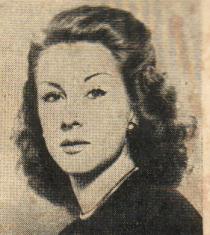 Pamela Branch (1920 - 1967) wrote four critically acclaimed crime novels in the 1950s. She was also a close friend of writer Christianna Brand, and her novels were reviewed with descriptions such as "a masterpiece", "totally silly and in questionable taste, but I enjoyed it", and "witty, hilarious and delightfully gruesome".
Pamela Branch (1920 - 1967) wrote four critically acclaimed crime novels in the 1950s. She was also a close friend of writer Christianna Brand, and her novels were reviewed with descriptions such as "a masterpiece", "totally silly and in questionable taste, but I enjoyed it", and "witty, hilarious and delightfully gruesome". Strangely most mystery readers have never heard of her, and I have not found a crime/mystery reference book yet that includes her, making it nearly impossible to find out more about her writing and her life. Admittedly, her style was an acquired taste: she was one of the few writers who were comfortable with making murder appear humorous.
Pamela had her four crime novels published within a short period of time: 'The Wooden Overcoat' and 'Lion in the Cellar' in 1951, 'Murder Every Monday' in 1954 and 'Murder's Little Sister' in 1958.
Her private life seems almost too glamorous and adventurous to be believable. She was born in Sri Lanka, studied art in Paris and acting in London, lived on a houseboat in Kashmir, trekked on horseback in the Himalayas and travelled extensively. She was married to a Englishman - there are varying accounts as to his profession: film censor, children's writer or barrister. She wrote her first novel in a monastery in Cyprus, her second and third in England and France, and her final novel in London.
Described by her good friend Christianna Brand (also a mystery writer) as "Beautiful... with eyelashes like bent hairpins", she and her husband were known (or at least thought) to be very well off, with Pamela once flying to Geneva simply because her husband wanted to buy a watch.
Pamela Branch died of cancer in 1967 at the age of 47. She was said to be completing a fifth novel in Ghana, West Africa in 1962, but it was apparently never finished.
My favourite Branch novel? "Murder Every Monday", which begins:
"Clifford Flush had murdered nobody since 1939. For fourteen uneasy years after his acquittal, he had tried to persuade himself that the tiger in him was fully tamed. He assured himself that he had no desire to lay a hand in anger upon anyone in the world except a fellow-member of his bridge club named Armitage. In 1953, unable to endure the man's pleasant smile and cautious bidding for another hour, he was overcome by an irresistible impulse and pushed him under a bus in Piccadilly."
No comments:
Post a Comment